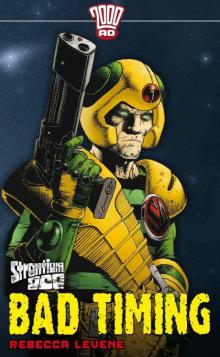- Home
- Rebecca Levene
Anno Mortis Page 4
Anno Mortis Read online
Page 4
He remained bent over it, pen poised, as the door opened.
"Young man," Seneca said.
Petronius raised his head, blinking. "Oh, I'm sorry. I was so engrossed I didn't hear you enter. I've never read prose of such fluency before."
Seneca smiled. "Really? Well, I have been told my talent is quite unique."
It said something about Seneca, Petronius thought, that he was ready to believe so egregious a lie. Some people's opinion of themselves was so high that no flattery seemed too outrageous.
"I stand in awe," Petronius said, carefully shifting his elbow to cover the blank scroll on which he was supposed to have been writing.
Seneca nodded, taking this as his due. "I came to tell you that I have a meeting to attend. The rest of the morning is yours, though your father has instructed me that you're not to leave this house except in my company."
Of course he had - the old bastard. Still, Seneca must have some household slaves working for him. Petronius would simply have to make his own entertainment. He managed a smile. "Don't worry, sir. Despite what my father may have told you, I value nothing more than quiet study and contemplation."
That, he quickly realised, was a lie too far. The old man frowned at him disbelievingly, then shrugged. "Your may spend the day in your sleeping quarters, or in the public areas. My own rooms, of course, are out of bounds." And with a curt bow, he was gone.
He left the door open behind him, and Petronius remained in his seat, listening to his retreating footsteps until he was quite sure the other man had gone.
His bones clicked as he stood, stiff after so long crouched on the floor. He looked down longingly at the scrolls he'd discovered, but he couldn't risk taking them. If Seneca discovered they were gone, Petronius might find himself out of an apprenticeship - with no guarantee that his own family would take him back.
No matter. He imagined he'd be spending quite some time in that room. Plenty of opportunities to uncover any other treasures that might be hidden there. He could make copies for himself when he had more time - or, if he was careful enough, leave the copies and take the originals for himself. Now he had an opportunity to explore the rest of the house without the old bore around, he should make the most of it. His quarters were to the left, the common areas lying between there and the door. That must mean that Seneca's own quarters were on the right. He'd start there.
His head was down, deep in thought, and he didn't see the slave until he'd walked right into him.
The man was so massive, he had to slope his shoulders to fit beneath the stuccoed ceiling. His arms were as thick as Petronius's thighs, knotted with muscles beneath the bronze skin.
"Where are you going?" the slave said. His voice was so deep it felt more like vibration than sound.
"Looking around," Petronius told him. "Seneca said I could have the run of the place."
The man nodded his head, like a rock teetering on the edge of a cliff before an avalanche. He was standing foursquare in front of the doorway leading to Seneca's quarters, blocking it entirely. It would have taken a small siege engine to move him. "The dining room is behind you," he said. "Food can be prepared, if you wish it."
"Of course," Petronius said.
He remained where he was, and so did the slave. They stared at each in silence for a few moments.
"Well," Petronius said eventually. "Perhaps a prayer before I eat. I'm a deeply religious man, as I imagine Seneca has told you."
The slave didn't respond. He shifted a little, moving his weight from one plate-like foot to the other.
"So where," Petronius persevered, "might I find the lararium?"
For the first time, something resembling an expression crossed the other man's face. He frowned. "There is no shrine to your gods here."
"My gods?" Petronius said. The lararium held household gods, not the great deities of Rome. "Well, no, of course, but as the newest member of this household, I'd like to pay my respects."
"No shrine here," the slave repeated, face mask-like once again.
"Then," Petronius said, "perhaps I'll head out to find a suitable temple. My day doesn't feel complete without a prayer."
He expected the slave to try and stop that too, but he just looked away, as if the conversation no longer concerned him. His massive arms remained folded in front of his smooth chest, and it occurred to Petronius that he looked like a statue of a god himself. One of those frightening Eastern ones who was terribly keen on sin and purity.
He gave the slave one last smile and backed away, unwilling to take his eyes off him. When he felt the door against his shoulder he slid round it and away, letting out a breath he hadn't known he'd been holding.
This stay with Seneca was proving to be considerably more interesting than he'd imagined. And considerably more nerve-wracking.
Caligula had been right: the Empire's records were a mess. Narcissus thought about Hercules, challenged to clean out the Augean stables in just one day, and decided that he'd had the easier task. The Emperor had left Narcissus in a room with a thousand sheets of parchment and one abacus. He flicked the beads from side to side, the click-click-click a distraction from the roaring of panic in his mind. He didn't know how to do this. He didn't even know how to start.
"It's pointless, you know," said a voice from the shadows.
Narcissus yelped and spun round so fast that he fell off his chair. Paper wafted in the air all around him as a figure appeared through the storm of white, brushing the sheets impatiently aside. It was a woman, a young one, face as pale and blank as the paper which surrounded her.
"Who -?" Narcissus said.
She held an arm out to him, and after a moment's hesitation he grasped it to lever himself off the floor. Only when he was on his feet again did he realise that he'd been holding a wrist - that there was no hand at the end of it.
"I'm your predecessor," she said.
She was quite pretty, he realised, her curly hair a shade darker than honey and her cheekbones high and sharp. But her skin had the unhealthy pallor of someone who didn't see the outside world enough, and there was a feverish brightness to her eyes.
"Your hand," Narcissus said.
She snatched the stump behind her back. "He took it."
"Caligula?"
She nodded, twisting her face away so that he couldn't read her expression. It brought the mutilated arm back into his line of sight, but he was careful not to look at it again.
"The Emperor told me about you," he said. "What he'd done."
She moved with startling quickness, slipping past him to perch cross-legged on the table in front of him. "I showed him. I showed him what was wrong, but he wouldn't listen. They told him I was lying, and he listened to them instead."
"He said..." Narcissus cleared his throat and looked away, embarrassed. "He said he didn't like the way you wrote."
She laughed at that, a high, jarring giggle that didn't sound entirely sane. "He didn't like what I wrote."
Narcissus nodded. He could well believe it. Caligula had a talent for seeing those things he chose, and overlooking the ones he didn't. How else could he believe that the people still loved him?
"And you?" she said. "Down here in the darkness with all the numbers. The rows and rows of numbers all lined up, like soldiers on parade. What is it you did that displeased him so?" The mounds of paper in the room muffled the sound of her voice, smudging it like ink on a page.
Narcissus picked up his chair from the floor, setting it in front of her before gingerly sitting down. She immediately shuffled backwards, her eyes wide and fixed fearfully on his.
He held out a hand to her, palm up, as he would have done if she'd been a skittish horse in need of gentling. "I'm not going to hurt you."
"Aren't you?" She frowned. "But you're here to replace me. If he has you, he doesn't need me. If he doesn't need me..."
Narcissus imagined her, all these weeks in this room, in the dark. Waiting for Caligula to finish the job he started with her hand.
To break her apart, piece by piece, until she wanted to die.
"I won't let that happen," he said. "I promise you."
"Oh, you promise." And now she looked entirely sane and far too knowing. "You've been promoted, have you, slave?"
"No. But I can help you, if you help me. I need you. I was never taught to calculate. I can't do the thing Caligula's ordered me to do - which is why he asked me to do it, of course."
She reached out suddenly, moving as quick as a striking snake to grasp his hand. He tensed then relaxed, letting her pull it towards her. She cradled it in hers, turning it from side to side, as if it was some rare and delicate artefact. Her fingertips trailed along the lengths of his fingers and over the ball of his thumb, a sensation that was half ticklish, half something else.
"Soft hands," she said. "But calluses, here, here and here." She touched the very tips of his fingers. "You're a musician."
"Yes," he said. "I understand songs - not numbers."
"Numbers are easy," she said. "Eight hundred and twenty-three thousand, five hundred and forty-three."
Narcissus paused, waiting for more, but that seemed to be it. She tilted her head to the side, waiting expectantly.
"That's... a very large amount," he said.
She let out a tssk of frustration, jumping from the table with the same snake-quick speed she'd shown before. She leaned towards him, bringing her mouth so close to his ear he felt the whisper of her breath in his hair. "The days of the week multiplied by themselves, of course. Numbers are easy - it's people who are difficult."
He pulled away so he could look her in the eye. "Then will you help me? So the same thing doesn't happen to me as happened to you?"
She shook her head, backing away until she was in the far corner of the room, half hidden behind a stack of ledgers. "Maybe that's what I want," she said. "Maybe I'd enjoy watching someone else suffer the way I did."
He could feel himself shaking as he studied her. She was what he might become, if Caligula had his way. "No," he said. "I don't think you would."
After a moment she sighed and nodded. He noticed that she was wearing a beautiful chiton, blue trimmed with gold lace, but it was torn and stained. He wondered who she'd stolen it from. Or had Caligula given it to her, back when she'd still been in his favour?
"What's your name?" he asked.
She smiled, a bright and carefree expression that made her look suddenly very beautiful. "I'm Julia. And you're Narcissus. Do you find your reflection as pleasing as he did?"
He felt himself blushing. "My mother named me for my father. She was sold away from him before I was born."
"Greek, yes. I will help you. Or, anyway, I'll tell you. Whether that will help, only the gods can know. Come - over here."
She led him to a shelf halfway along one wall, the wood buckling under the weight of the years of ledgers lined along it. She picked the furthest of these, its paper still pale and new, and pulled it to the floor, crouching in front of it on her heels. Narcissus knelt beside her, reading over her narrow shoulder.
"My work," she said, gesturing at the whole row of books. "Twenty-five years of records. Tiberius kept none while he reigned, there was nothing but disorder when I started. And here - look what I found."
She'd flipped to the back few pages of the ledger. Narcissus studied them, the lists of goods and money and what might have been ships' names beside row after row of figures, some large, some small - all incomprehensible. The only conclusion he could draw was that Caligula had a point about her handwriting.
"I'm sorry," he said. "I don't know what I'm supposed to be looking for."
"Here - just here!" She jabbed her finger down on one line: The Khert-Neter. "Every week this ship travels from Egypt to Ostia, empty, and every week it returns home with a hold full of oil."
Narcissus kept looking at the figures as if, given enough time, they might explain themselves. But nothing made sense and he began to wonder if this imagined finding was nothing more than a delusion. "So? Hundreds of ships trade with Rome every week. It's the lifeblood of the Empire."
"Idiot!" she said. "As foolish as him! Listen. They travel the sea every week, three days' journey across wave and through storm and all to bring a hold full of air?"
And, finally, Narcissus thought he understood. "Yes, yes. I see. Why not carry something on the way there as well as the way back? They're halving their profits - it doesn't make sense."
"Exactly," she said. "He understands." She rocked back on her heels, looking up at the ceiling with her eyes half lidded. "And when a thing makes no sense, what do we conclude?"
Narcissus could feel the excitement building in him now. "That it's not what's really going on. That ship wasn't empty - it was carrying something on every trip. But whatever it was, they didn't want it entered in the Empire's records. Smugglers, I suppose."
"Maybe. Possible, yes."
"And you told Caligula about this?"
Her eyes closed completely for a moment and she shuddered. "Yes. But the ship belongs to Seneca - an honoured man. A free man, a citizen. He told the Emperor I lied."
"And the Emperor believed him and not you," Narcissus said bitterly. And, of course, if he made the same accusation now, the outcome would be the same. Worse, probably. He knew that Caligula didn't care about him - he enjoyed tormenting his uncle. The more he made Narcissus suffer, the more it would torment Claudius, so he'd make that suffering as terrible as he could contrive.
She must have read something in his face, because she nodded sadly. "Proof. We need evidence - something more concrete than this."
He looked back down at the ledger. "Am I reading this right? Does the ship follow the same schedule every week?"
She nodded. "Into Ostia on Mercury's Day. Loaded and leaving again that same night."
He jumped to his feet, wishing this room had windows so he could judge the position of the sun. "It's Mercury's Day today, isn't it? The ship might be in port now."
"It arrives at midday, leaves at midnight," she said. "There's still time."
And something in the tilt of her smile, or the way her eyes wouldn't quite meet his, told him that this had been her intention all along: for him to finish the job she'd started. He was being used, but then he'd intended to use her, so he supposed it was only fair. And saving her might be the only way to save himself.
"Fine," he said. "I'll go to the docks. And hope that Caligula doesn't come looking for me in the meantime."
Training was brutal for Boda that morning, the other gladiators taking every opportunity to bruise and wound her. By the time lunch approached she was exhausted and aching and only a few lucky blocks away from losing an eye. But the dusty training ground felt solid beneath her feet, and in the light of day the horror of last night seemed more tolerable, the memory already losing its vividness, like a painting that had been left out too long in the sun.
And yet she couldn't quite forget. Every time she looked up after a fight, wiping away the sweat that dripped into her eyes, there was Quintus. He lurked in the shadows, a measuring look on his face as he watched, and she knew that whatever business had begun between them last night wasn't finished.
When midday approached, a messenger came for him. A slave, young and round-cheeked, he drew the older man aside and whispered in his ear. She was resting when it happened, pouring a handful of water over her head to try and cool off in the endless heat.
Quintus's eyes flicked to her, as they often had during the morning, but this time they didn't flick away again. "Boda, my somnolent Siren, are you worn out already? Truly, your stamina must improve if you're to last another bout in the Arena. Vibius there - give our barbarian queen a work-out."
Vibius eyed her balefully as he picked out the sharpest of the wooden practice swords and gestured her towards him.
Quintus smiled and executed a small, mocking bow - then turned to follow the messenger slave towards the entrance.
Trapping her here so she couldn't follow him, she th
ought. Which was foolish. It might not have occurred to her that he was worth following, if he hadn't gone out of his way to ensure she couldn't.
She threw her short sword to the ground. "Sorry, Vibius, I have something more important to attend to."
The jeers and catcalls of the other gladiators followed her as she left the training ground, but she didn't let it bother her. If she could prove that Quintus had lied to her, that - for some reason - he'd deliberately arranged to have Josephus killed, then maybe she could restore her honour in their eyes. Maybe she could restore it in her own.
Outside, the streets were crowded with slaves and citizens too poor to make others work for them in the noon heat. Quintus was already far ahead and she let him stay there, sticking to the shadows as she trailed him past the austere Temple of Serapis and towards the heart of Rome.
He stopped several times, forcing her to hang back too, but she didn't think the people he spoke to were the reason for this trip. His expression was too unguarded, and theirs too open. They were probably just spectators from the games, she thought bitterly, congratulating him for putting on such a fine and bloody show.
She'd seldom been outside the gladiator school since she was brought to the city and she was struck once again, as she had been on her arrival, by the sheer size of the place. Even the simple tenement houses were bigger than the chief's mead hall in her own village, and towering above them were great edifices of marble, their purpose unknown to her but their message clear: here sat the wealth and power of the world.
What was wrong with these people, to want to live so close together, without trees or grass to remind them of their roots in the ground? This was a city of strangers, where every day unknown faces passed on the street. No wonder they were so cold, so in love with blood for its own sake. In a place such as this, one could forget how to be human.
She was so lost in her own thoughts she almost failed to notice when Quintus finally reached his destination. And when she saw where it was, her spirits sank. The bath house. She'd wasted an hour and more following him to no purpose.

 Smiler's Fair: Book I of The Hollow Gods
Smiler's Fair: Book I of The Hollow Gods Cold Warriors
Cold Warriors The Quartz Massacre
The Quartz Massacre The Hunter's Kind: Book II of The Hollow Gods
The Hunter's Kind: Book II of The Hollow Gods Kill or Cure
Kill or Cure Bad Timing
Bad Timing Grand Thieves & Tomb Raiders
Grand Thieves & Tomb Raiders Ghost Dance
Ghost Dance Anno Mortis
Anno Mortis